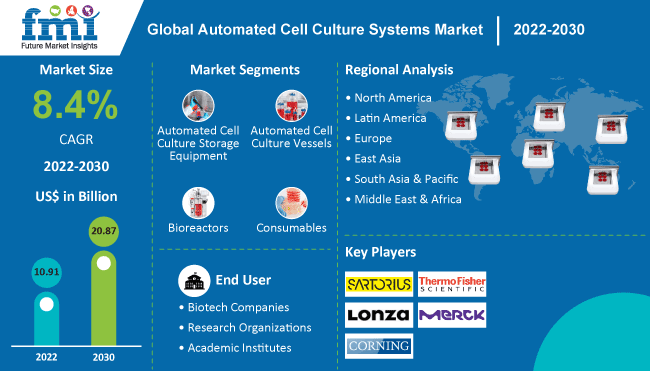The Global Automated Cell Culture Systems Industry is on an impressive trajectory, with an astounding Compound Annual Growth Rate (CAGR) of 8.4%. According to recent projections, this market is set to skyrocket from its 2022 valuation of US$ 10.91 Billion to an estimated US$ 20.87 Billion by 2030.
Besides, 3D cell cultures, which were cumbersome and costly earlier, have become feasible, owing to the advent of spheroids. Also, they imitate tumors better due to the hypoxic core and the presence of nutrient gradient.
Researchers in the US and Germany have come up with a protocol to grow 3D cultures of generally used cancer cells to facilitate drug screenings. These factors will continue to put North America and Europe at the top pedestal in the Global Automated Cell Culture Systems Industry.
Further, the requirement of cell lines for devising vaccines against COVID-19 infection will augur well for the automated cell culture market despite the pandemic-induced economic downturn.
Request a Sample of this Report Now!
https://www.futuremarketinsights.com/reports/sample/rep-gb-7860
Key Takeaways from the Global Automated Cell Culture Systems Industry
- Consumables are expected to reach US$ 11 Bn by 2030
- Academic institutes are expected to take greater interest in research related to cell culture over the forecast period due to increased government funding in developed countries
- North America and Europe collectively accounted for more than 60% of market share in 2019
- Infinite cell line cultures held close to 75% of market share in 2019
New Product Launches to Remain Key Strategic Focus of Market Players
Players in the automated cell culture systems market are focusing on new product launches to expand their global footprint and strengthen their product portfolio.
For instance –
- In Jun 2020, faCellitate announced the launch of “BIOFLOAT”, it’s very first product to improve 3D cell culture.
- In Mar 2020, BioProcess International started implementing single-use miniature bioreactors for supporting intensified cell culture by using functional performance indicators for assessing small-scale model
- Corning Incorporated, in Oct 2019, came up with Corning Elplasia Plates and Matrigel for organoid culture. It was an addition to its 3D cell culture portfolio
- Ori Biotech has started developing an automated way of manufacturing cell and gene therapies
- In May 2020, Sartorius announced the launch of the Incucyte SX5® for live-cell analysis, for live-cell analysis experiments
Methodology Details Just a Click Away!
https://www.futuremarketinsights.com/request-report-methodology/rep-gb-7860
Global Automated Cell Culture Systems Industry: Competitive Insights
The Global Automated Cell Culture Systems Industry is set to expand its scope in the forecast period, stimulated by increasing drug discovery research and diverse applications of cell lines for research purposes. Furthermore, automated cell culture systems are used for experiments in drug discovery research and in the cell banking process. In addition, cost-effectiveness and the rise in alternative methods for traditional cell culture production are augmenting the adoption of automated cell culture systems.
Key market players covered in the market include Thermo Fisher Scientific, Corning Incorporated, Merck KGaA, Lonza, Sartorius AG, Tecan Trading AG, Hamilton Medical AG., Biospherix and Promocell GmbH. Key players integrate their positions through acquisitions, mergers, and new product launches.
Key Segments of Automated Cell Culture Systems Industry Survey
Global Automated Cell Culture Systems Industry by Product:
- Automated Cell Culture Storage Equipment
- Automated Cell Culture Vessels
- Bioreactors
- Consumables
Global Automated Cell Culture Systems Industry by Cell Culture:
- Finite Cell Line Cultures
- Infinite Cell Line Cultures
Global Automated Cell Culture Systems Industry by Application:
- Drug Development
- Stem Cell Research
- Regenerative Medicine
- Cancer Research
Global Automated Cell Culture Systems Industry by End User:
- Biotech Companies
- Research Organizations
- Academic Institutes
Examining the study’s underlying assumptions. Ask an Analyst
https://www.futuremarketinsights.com/ask-question/rep-gb-7860
Author
Sabyasachi Ghosh (Associate Vice President at Future Market Insights, Inc.) holds over 12 years of experience in the Healthcare, Medical Devices, and Pharmaceutical industries. His curious and analytical nature helped him shape his career as a researcher.
Identifying key challenges faced by clients and devising robust, hypothesis-based solutions to empower them with strategic decision-making capabilities come naturally to him. His primary expertise lies in areas such as Market Entry and Expansion Strategy, Feasibility Studies, Competitive Intelligence, and Strategic Transformation.
Holding a degree in Microbiology, Sabyasachi has authored numerous publications and has been cited in journals, including The Journal of mHealth, ITN Online, and Spinal Surgery News.
About Future Market Insights (FMI)
Future Market Insights, Inc. (ESOMAR certified, recipient of the Stevie Award, and a member of the Greater New York Chamber of Commerce) offers profound insights into the driving factors that are boosting demand in the market. FMI stands as the leading global provider of market intelligence, advisory services, consulting, and events for the Packaging, Food and Beverage, Consumer Technology, Healthcare, Industrial, and Chemicals markets. With a vast team of over 5,000 analysts worldwide, FMI provides global, regional, and local expertise on diverse domains and industry trends across more than 110 countries.
Contact Us:
Future Market Insights Inc.
Christiana Corporate, 200 Continental Drive,
Suite 401, Newark, Delaware – 19713, USA
T: +1-845-579-5705
For Sales Enquiries: sales@futuremarketinsights.com
Website: https://www.futuremarketinsights.com
LinkedIn| Twitter| Blogs | YouTube
